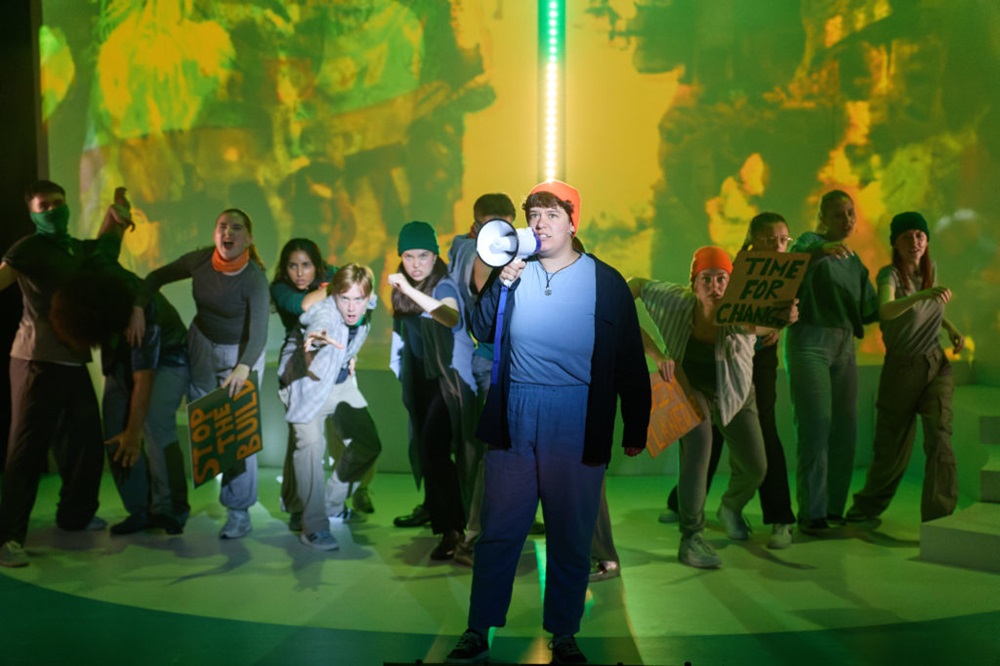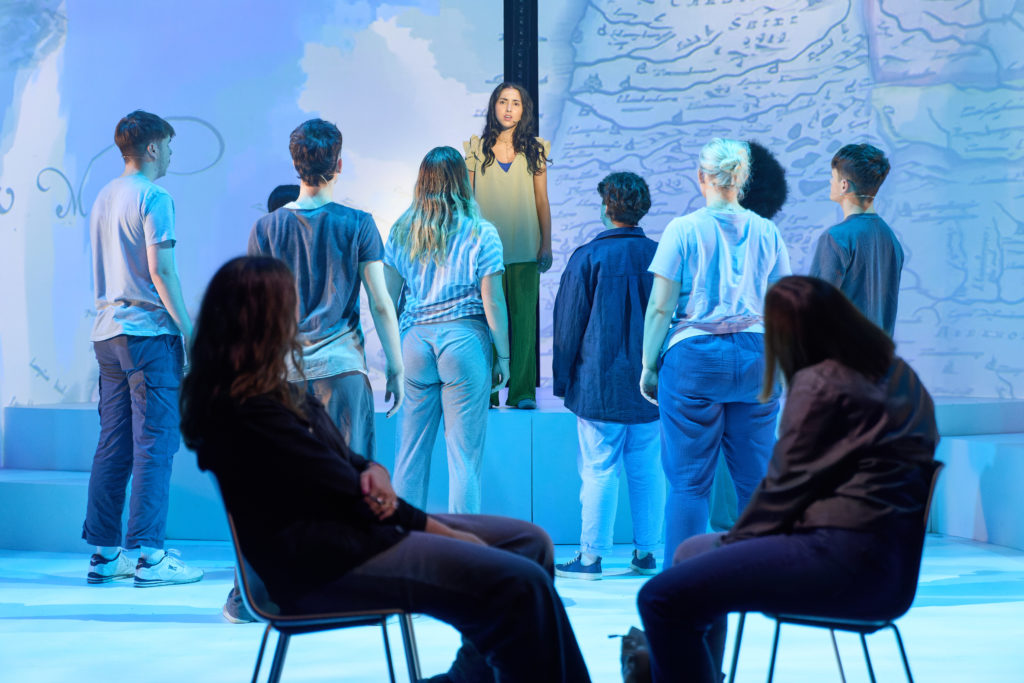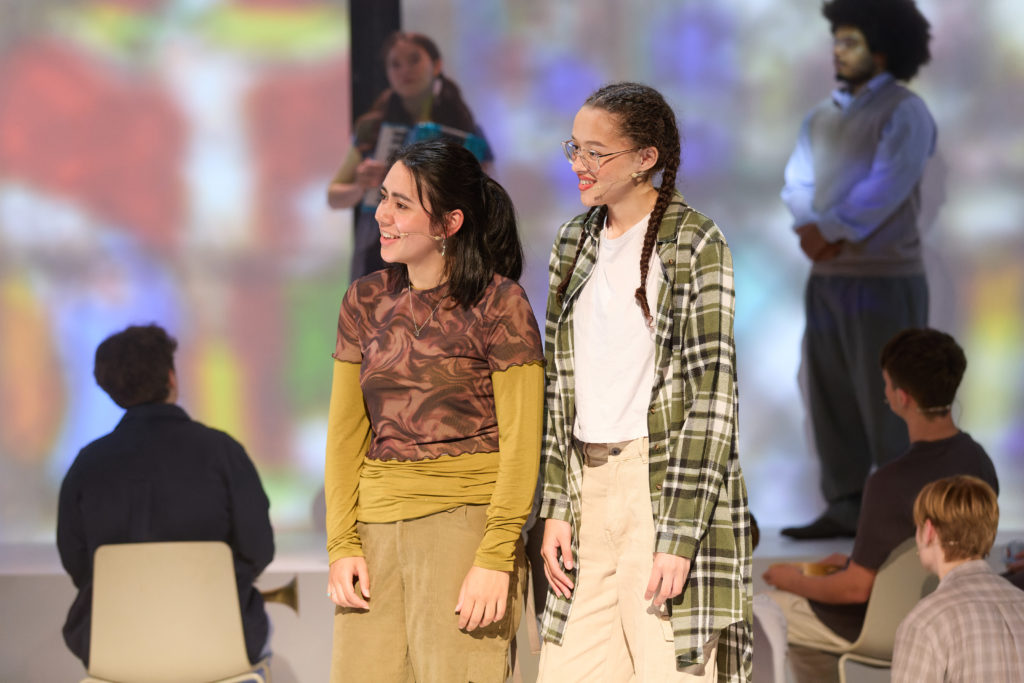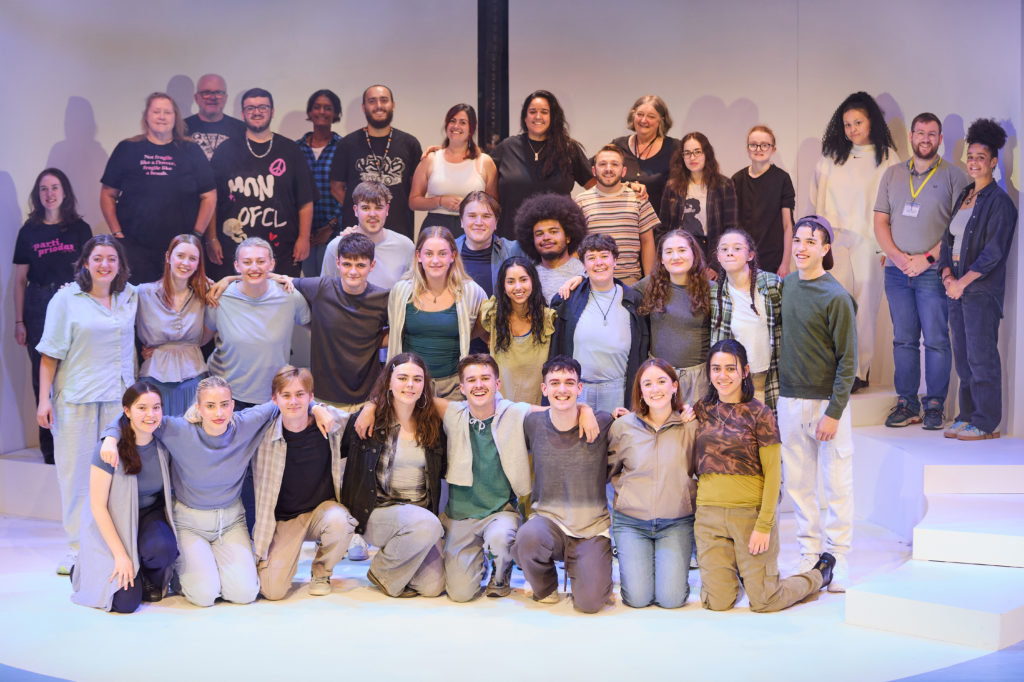Theatre review: Dal Gafael/ Hold On

Molly F. Stubbs
Leaving a Bridgend shrouded in thick rain clouds, I set off armed with my Maps app bound for Galeri Caernarfon. Having missed the first two showings of National Youth Theatre of Wales, Fio and Theatr Genedlaethol Cymru’s newest production, Dal Gafael at Cardiff’s Sherman theatre, a road trip was to be taken. So behind the wheel of my trusty Suzuki Swift I clambered, and set off on the eight-hour journey to see directors Dr Sita Thomas and Steffan Donnelly’s most recent creation.
Dal Gafael follows two teenage girls, Mer (Dyddgu Jones) and Sade (Susana Myint), who have lost their mothers (Mali Grigg and Prakriti Wood) in tragic circumstances. Despite being surrounded by family (Aleisha Walters, Macsen Forrest, Jona Milone, Hannah Bianchi-Jones) and friends (Kellie-Gwen Morgan, James Makepeace) who continually go out of their way to support them, the girls just can’t seem to function while the enormity of their losses bear down on them.
Help comes when, through a crack in the universe, the two are connected in their suffering across time and space. Mer hops over to a parallel 2024 to help Sade seek justice against the government for her mother’s death and, in turn, finds a way through her own grief.
No topic affecting today’s youth is too big or small for Dal Gafael’s biting commentary to take on. From mental health struggles and the loss of a loved one to disregard for worker wellbeing in pursuit of progress, climate crisis, erosion of the public’s right to protest, and the political tendency of the past fourteen years to broken promises, the production is jam-packed with more exploration of societal issues than a GCSE drama classroom.

Relatable
These topics may seem slightly lofty, even after they’re put into tangible form by the play’s story. But Dal Gafael’s script, penned by Mared Llywelyn and Steven Kavuma, brings the audience right back down to earth with relatable complaints reserved only for the Welsh. I too, as a former student of Aberystwyth University, had to go through Shrewsbury on the train before I could get home to Cardiff. I too cannot swim in the sea at my local beach because of the ‘abnormal’ sewage situation. I too have an aunt who forces me to eat mung bean curries and ice cream cake that hasn’t been popular since the 70s. Despite the anger many of these problems stir up in the audience, there’s something supremely comforting about knowing we are not alone in experiencing them.
Dal Gafael doesn’t maintain this comfort for too long, though. Even if you can’t relate to what’s unfolding onstage, even if you prefer to avoid the news in pursuit of a positive mental attitude, its players want you to know keenly that the events affecting Mer and Sade affect you too.
Two fourth wall breaks achieve this connection. The first sees a mob of rightfully angry protesters running down the auditorium’s stairs, made all the more panic inducing by Galeri Caernarfon’s creaky seating infrastructure. And second, through a Question Time-esque talk show wherein the actors take up empty seats in the audience, their boos and jeers heard from next to us rather than in front of us.
Humour
Despite, or perhaps because of the ‘dark’ topics it tackles, Dal Gafael doesn’t scrimp on humour. Hats must be taken off here to Holly Mayhew and Elena Gower for their hilarious portrayals of a struggling prime minister and her devoted deputy. Also to Efan Williams, Tomos Rhys, Ashton Williams, Rhys Bowen, Meg Gillard, Nel Hay, Beth Mytton, and Leon Bogacz, who make up a cabinet so comedic it might well have been ripped straight from The Thick of It, and a gaggle of journalists far better at their jobs than their non-fictional counterparts. Oh, and to Alys Jones, who I would like to play the accordion in every production she’s in from now on.
Characterisation
As well as line reads befitting of national television, not one cast-member lacks in physical characterisation. Thanks to Cory Shipp’s beautiful yet simple set, focus is placed on the thespians’ physicality, and movement directors Grace Goulding, Rebecca Wilson, and Dr Sita take every opportunity for somatic storytelling.
Dance numbers abound, but the true mastery is in the silent reactions, a quirked eyebrows or a flick of a fringe. Let your eyes drift from whoever is currently speaking, and you’ll find theatrical talent rare for a youth theatre group. Did I feel tears prickling when Mer and her brother were sat on Aberystwyth’s beach, finally reconnecting after the loss of their mother? Yes, but it could’ve just been the residual effects of the flare that Meg Gillard’s incensed protestor set off on stage. Talk about a 4D experience.
Conjuring
Praise must be given too, to the production team, Garrin Clarke, Eadyth Crawford, and Matt Powell, who with only a few projections and sound effects manage to conjure up house parties and raves, television debates and memorial services, long train journeys and Aberystwyth’s famous seafront.
The point at which I feel a lot of productions like Dal Gafael struggle is when they have to answer the inevitable question: ‘what now?’ Yes, life isn’t easy for those on stage, and in many ways that’s what makes plays that attempt at social commentary interesting to watch. But where should the characters, and by extension the audience, go from here?
I was pleasantly surprised to find that Dal Gafael offered several options. The play takes an unusual but understandable departure from the popular line that we should heal the world to make it better for our children, instead arguing that we should seek to solve problems to gain justice for our parents.

Help
Additionally, Mer, who the audience spends much of the story telepathically connected to, is not the one who receives help but offers it. It reminded me of the best piece of advice I was given at the height of my teenage angst; your own healing will come through a willingness to recognise and heal the suffering in others. As for her own grief, Mer accepts that it will come in waves, and there’s no way to tell whether the tide is going in or out.
With this in mind, though, Dal Gafael begged of the audience a silent but altogether harder-to-answer question. At twenty-five, still clinging to my youth, I found the play heartwarming and impressive in equal measure. But with its willingness to indulge in the enormity of the issues facing the world, and shamelessly suggest overtly idealistic solutions, I can’t help but feel this production would be far better suited to an audience matching in age to the actors.
So, how do we get young people into the theatre to watch such plays? It’s not a question I could produce an answer to on my journey back to Bridgend, although NYTW are working hard to that end. I know only that the eight-hour drive to watch Dal Gafel was very much worth it, and ask that you perhaps do the same for future youth theatre productions.

Dal Gafael // Hold On ran from 3rd to 7th September 2024 at Sherman Theatre Cardiff and Galeri Caernarfon. If you’d like to learn more about its talented cast and crew, further details can be found here.
Support our Nation today
For the price of a cup of coffee a month you can help us create an independent, not-for-profit, national news service for the people of Wales, by the people of Wales.





